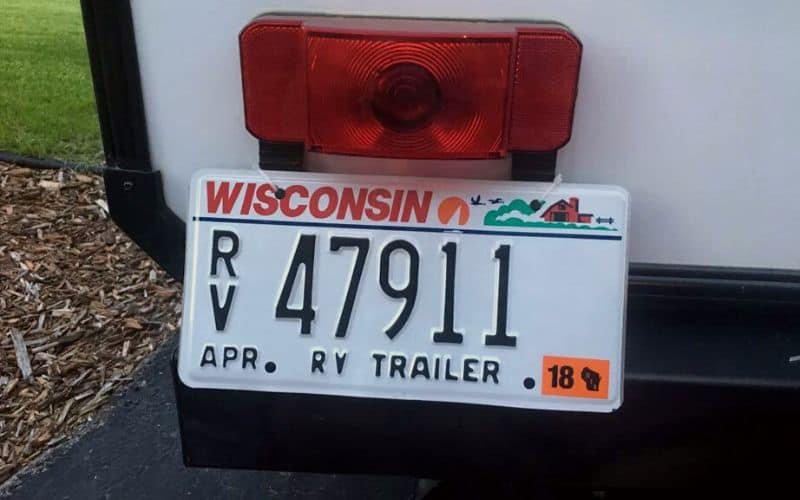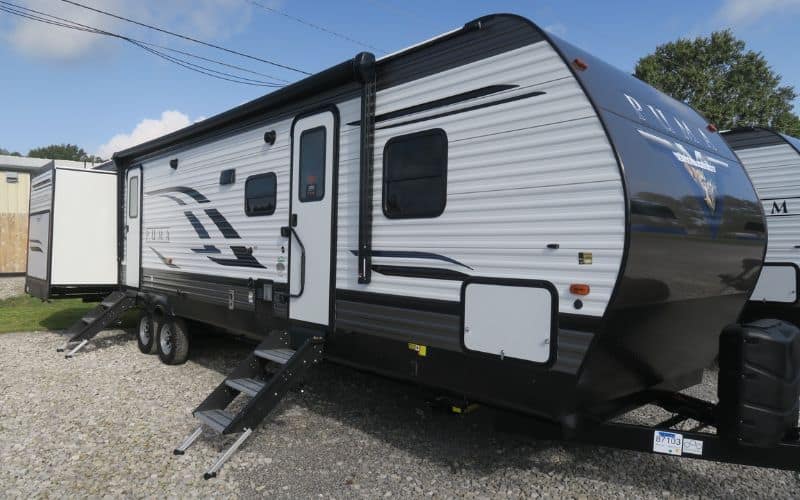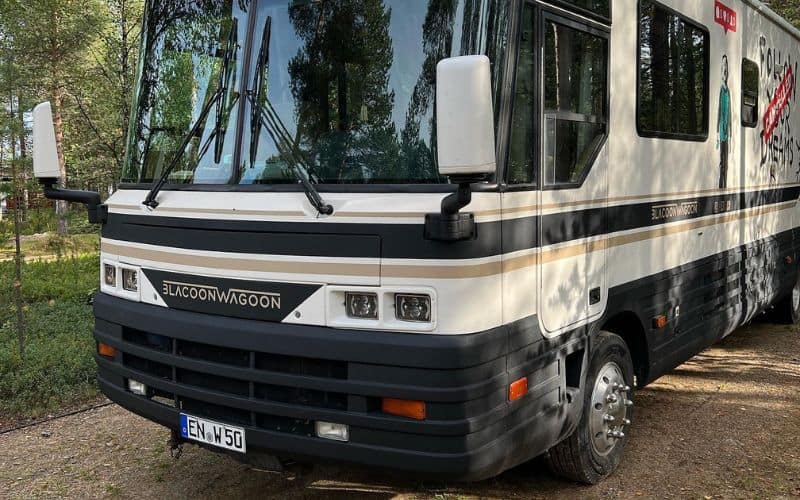 for Your Camper or Trailer?" width="800" height="500" />
for Your Camper or Trailer?" width="800" height="500" />You might be surprised to hear that each state carries its own specific laws on the types of vehicles, trailers, and towable RVs that need to be licensed and registered to legally travel on public roads. However, almost all require a license for travel trailers and campers.
Making sure that your trailer is properly registered, licensed, and up to date on the tabs might seem like a minor inconvenience that you can put off.
However, the punishment for driving an improperly licensed trailer or a trailer without a license plate in a state that requires them can be stiff.
Though different states have different regulations on the license plate and registration requirements for different types of trailers and towable RVs.
Understanding the requirements in your state and the states you plan to visit with your trailer will go a long way toward avoiding a hefty fine ruining an otherwise amazing vacation.
IN THIS ARTICLE
 for Your Camper or Trailer?" width="800" height="500" />
for Your Camper or Trailer?" width="800" height="500" />
Most states require you to have a license plate on a camper or travel trailer.
Though there might be some exceptions for utility trailers, farm-use trailers, and other functional towable trailers.
Different states might also have different regulations for things like titles, insurance, registration, and license endorsement requirements.
Utility trailers and equipment trailers can be enclosed or have an open-top they are typically used to haul small loads and tend to have more relaxed license and registration requirements.
Whether or not you need a license plate depends on the state and what you are hauling. Many states don’t require license plates or minimal plate requirements for farm-use trailers
Most states require popup campers to have a license plate. However, a few states might not require titles as popup campers are generally lightweight and smaller.
If you purchase a used popup camper and didn’t receive a title, you will likely need a bill of sale with a Vehicle Identification Number.
Then the Department of Motor Vehicles can order a replacement title for you.
Almost all states recognize travel trailers as towable RVs and require you to have an up-to-date license plate.
Registration requirements, renewal times, and other regulations vary widely from state to state.

A few rare exceptions and state exemptions allow you to tow your trailer on a public road without a license plate.
Most of the time when you purchase a new trailer it won’t have a license plate.
Most dealerships will give you a temporary plate or a sticker to hang in the rear window that notes the date of purchase and the reason for the license exemption.
A lot of states you up to 30 days to obtain your license for the trailer. If you are pulled over for driving without a license plate, show the bill of sale to prove you’ve recently purchased it.
A lot of states have license plate exemptions for farm-use trailers. This includes trailers that are being used to haul farming items, such as livestock, produce, or equipment.
Though you should check with your local and state agencies before towing a farm-use trailer on public roads.

The duration of time between license renewals for a trailer, camper, or towable RV can vary from state to state.
In some states, the renewal is annual; in others, it might be five years. Even a few states like Arizona let you pay a one-time trailer licensing fee.
| State | License Requirements |
|---|---|
| Alabama | Renew trailer license every 5 years |
| Arizona | One-time fee, must register within 90 days of purchase |
| Arkansas | Every two years |
| California | Every five years |
| Colorado | Annually |
| Connecticut | Every two years |
| Delaware | Every two years |
| Florida | Annually, but 2 years for motorhomes |
| Georgia | Annually |
| Hawaii | Annually |
| Idaho | Annually |
| Illinois | Annually, with a lifetime license option for a trailer over 8,000-pounds. |
| Indiana | Annually |
| Iowa | Annually with plate replacement every 8 years. |
| Kansas | Annually for trailers over 2,000 lbs. |
| Kentucky | Every 5 years. |
| Louisiana | Every 2 years |
| Maine | One and two-year renewal options are available. |
| Maryland | Every 2 years. |
| Massachusetts | Every 1 or 2 years depending on the plate type. |
| Michigan | Every 3 years. Permanent license available for certain types of trailers. |
| Minnesota | Every 3 years, with permanent options available for certain types of trailers. |
| Mississippi | Annually. |
| Missouri | One year with a two-year option available. |
| Montana | One-time permanent option available |
| Nebraska | One calendar year. |
| Nevada | One to three-year options by trailer. |
| New Hampshire | Annually |
| New Jersey | Annually on March 31 st of every year. |
| New Mexico | Annually permanent options are available for some trailer types. |
| New York | Annually |
| North Carolina | Annually |
| Ohio | Staggered registration based on trailer type varying from every one to eight years. |
| Oklahoma | Annual trailer tag |
| Oregon | Every two years |
| Pennsylvania | Annually |
| Rhode Island | Every two years |
| South Carolina | Every two years |
| South Dakota | Annually |
| Tennessee | Annually. However, Tennessee does not require individuals to title and license utility trailers for private use, as long as you are pulling the trailer behind a Tennessee-licensed vehicle. |
| Texas | Annually for trailers over 4,000 lbs. |
| Utah | Annually |
| Vermont | Annually |
| Virginia | Annually, every two years or permanently depending on the trailer type. |
| Washington | Annually with special options for “Intermittent Use” Plates. |
| West Virginia | Permanent plates issued when registered |
| Wisconsin | Annually |
| Wyoming | Titled and registered annually |
Most states allow you to renew your registration online, by mail, or in person. Renewing online is convenient, though you might expect delays if you need new plates or tabs.
There are also minor fees attached to the shipping costs. A lot of states also charge an additional 3% to 5% processing fee for using a debit or credit card for online purchases.
A lot of travel trailers need and have a title. Though state title regulations for various types of the trailer can vary.
If you purchased a used travel trailer from a private party and they didn’t have a title, you can get a replacement title through your local DMV.
Though you will likely need to provide the bill of sale as proof of the purchase and all your pertinent documents.
While some states might let you get away with not putting license plates on an equipment trailer or farm-use trailer.
Pretty much all states require you to maintain an active license and registration on RV towable trailers, popup campers, travel trailers, teardrop campers, and the like.
If you buy your trailer new from a dealership, you will have a limited window with which you can legally drive it on the roads without a license plate or active tabs.
Though you will still need to register it within 30 to 60 days of the purchase. At that time, your state’s DMV will start the process of issuing your license plates for the trailer.
Just how often you’ll need to renew the license on your trailer will vary. Some states allow you to pay a one-time fee, whereas others require you to renew the license annually, biannually, or even go as much as five years before requiring renewal.
Aaron Richardson is an expert RVer and the co-founder of RVing Know How. Aaron, along with his wife Evelyn, has been living and traveling in their Keystone Fuzion RV since 2017. Their adventures span across the country and beyond, including memorable RVing experiences in Mexico. Aaron's passion for the outdoors and RVing shines through in his writings, where he shares a blend of travel stories, practical tips, and insights to enhance the RV lifestyle.